Double Fine has announced Psychonauts 2, a sequel to 2005's Psychonauts. To find out more about the game, GameSpot spoke extensively with Double Fine founder and director of the game, Tim Schafer.
GameSpot: Why Psychonauts? Why now?
Schafer: I mean, we've been thinking about it for years. For ten years we've been thinking about doing a sequel to Psychonauts and it's come up again and again. It's like, "Maybe now's the time" but it's never been the time and I think during our campaign for Broken Age and our working on that game and feeling really independent for the first time like really publishing our own games and doing our own thing. We feel like, we really have control over our future and what we really really want to do next and that's Psychonauts 2.
Just the empowerment of crowdfunding success was like, "Hey, maybe we can make this work?"
Yeah. I mean a lot of things kind of came together. For one, we always wanted to do it. For another, I feel like we've learned enough that we could do an even better version of that game. And I have to credit Notch in some ways when he tweeted that thing about wanting to help us make it. For a long time we kinda figured, "Ah, that's impossible" and I'd done this article saying it was impossible and then he was like, "Hey, let's do this." That didn't end up working out but it still kind of woke up that part of my brain that kind of like, "You said we could do it. Come on, let's do it. We have all these ideas. We have this backlog of story ideas and mental world ideas and all these things we want to do." In some ways it just kind of started this little fire that wouldn't be put out.
What is it about Psychonauts for you that has left this impression and had you thinking about it for all these years? What's special about Psychonauts?
First of all, I really love Raz. When that character finally came together and Richard Horvitz was doing the voice and who he turned out to be, I really feel this fondness for him and for Lili and all the characters in that world. I wanted to go back to them and see them succeed and go on new adventures together. That combined with the rich possibility for that world, the fact that there's no set place that Psychonauts has to happen. Psychonauts happens in all of our minds so it could be anything you could imagine. It could be a level in Psychonauts and so the potential there to try anything we wanted to do is just really tempting.
STAR WARS: Prequel Pack - Official Reveal Trailer DEAD OR ALIVE Xtreme Venus Vacation PRISM - Official 2nd Trailer Phantom Blade Zero - 6 Minute "Year of the Snake" Gameplay Trailer The Hundred Line -Last Defense Academy-: Character Trailer 1 Black Ops 6 & Warzone - Official Season 02 Launch Trailer GUILTY GEAR STRIVE: DUAL RULERS - Official Main Trailer Marvel Rivals | The Spring Festival Trailer Kingdom Come: Deliverance 2 Roadmap Trailer Zenless Zone Zero - Astra Yao Character Demo | "Ridu Holidays" BlazBlue Entropy Effect - Hazama Character DLC Gameplay Reveal Trailer Helskate Launch Trailer Code Violet | Announcement Trailer
Please enter your date of birth to view this video
By clicking 'enter', you agree to GameSpot's
Terms of Use and Privacy Policy
Is it over the years you would have some wild idea that maybe didn't fit with the project that you were working on at the time, but you went, "Hey, maybe we can make that live in Psychonauts?" Is there a big word document somewhere on somebody's computer, where you just typed in all these ideas over the years?
Yeah, I've had a Google Doc for years that and just kind of kept it going every time either I meet someone with a really unique personality or I hear about some thing that could happen to your brain that can give you a problem and think about how you would overcome that problem, how that problem would represent itself to you in your dreams, in your subconscious. I write that down and keep track of that. Plus, we've been thinking about new ideas now. Yeah, so we have a backlog of mental ideas. We could probably come up with one in this interview!
Why Fig and not Kickstarter? Because Kickstarter worked out for Broken Age. Why not stick with it? What is it about Fig that makes you want to use that service instead?
We had a great experience with [Kickstarter] before, but there was always this feeling of ... some people were uncomfortable with us getting that money. They kind of felt like we got something for free. That they felt like there's a sense of, "Why do you get this for free? What's everyone else going to get? And what if your game's a huge huge hit? What is everybody going to get?" There was never really a great question of that except for to say that you're patronizing the arts and your supporting it and that's what we believed and I feel like that works.
But when you're starting to talk about how we want to do this with a lot of games, not just that one game. It was kind of an event, it felt like this really unusual thing. There's a lot of novelty to it. I don't want it to be a novelty, I want it to be a very standard way for making games, very repeatable. That means to make all kinds of games with it, which means higher budget games instead of just doing small games. What if we just fund the kind of games that we were making before, like Psychonauts, that size. But that budget brings up the question like wow, that first budget of Psychonauts was 13 million dollars, if you want to try and get that, I feel like you need to give something back. What Fig allows you to do is let people invest in the game and they can back it like they could before, but they can also invest money in it where they can actually share in the royalties of the game. If the game is a big, big hit, they can participate in that along with the developer. That's the new thing with Fig and it's going to allow us to in a sense, share in the success of the game with the people who backed it.
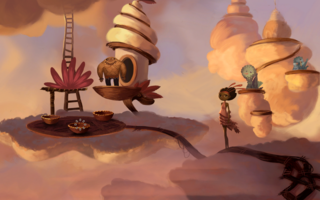
You guys talked about this a lot in the Broken Age documentary about sort of the funding, but from the outside, a lot of fans were upset with how they perceived the money had been spent saying, "They ran out of money and they shipped half a game." There was all this consternation over the way that the Kickstarter went and how the budget was used. Do you feel like the studio has learned from that and that using Fig is a response to those issues?
Most of that response came from people who weren't backers, who were outside of it, who were looking in some ways for someone to represent the risks of Kickstarting a project that it could go bad. They're like, "Aha! Finally a project has gone bad" but they didn't stick around for the whole story where we matched the backers funding with our own funding and we finished the game and it turned out great and people like it. I think that's the other side of that story, but I think Fig definitely answers that question of what are you getting back and what are you sharing with people?
People shouldn't be worried about donating for Psychonauts 2. They should feel comfortable that it's going to work out that their money is going to be well spent and they shouldn't have any concerns.
Whenever you're crowdfunding anything there's also risk to it. I think as a company who has successfully shipped two crowdfunded titles, I think you should have more confidence. I think you should be pretty confident that we're going to do a good job with it. I think we've proven that we're responsible with people's money when it comes to crowdfunding titles. We've shipped everything that we crowdfunded and we have two rewards left that we have to ship on Broken Age and then we can say, we've given everything we've promised on those Kickstarter campaigns.
It sounds like you want this model to be repeatable and almost a true alternative for all types of developers. It's a way to empower any kind of creator and something that is widely used in place of maybe a traditional publisher model. Is that fair to say?
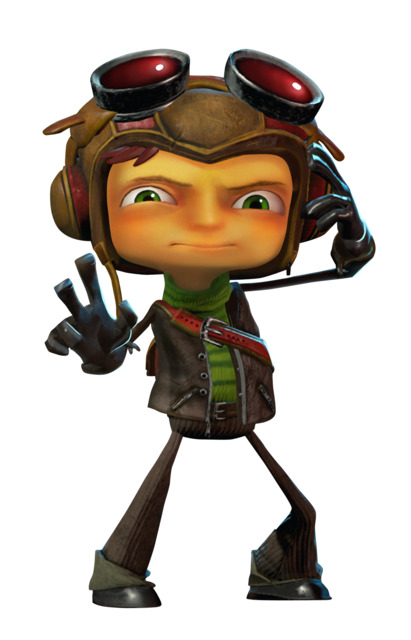
I mean, it's there to work with. All sorts of different cases and I think some of them could involve publisher partners and I think some of them could go it alone. Basically I think crowdfunding is here to stay and with Fig we want to completely change the way the games are funded forever.
Is Psychonauts 2 going to be huge, big budget, giant campaign, or is it going to be something a little more episodic? Is the budget going to dictate the size of the game? What are your ambitions and how is the budget and the funding going to impact that?
We want to do a game that stands up to Psychonauts 1. We want to do a game of that scope and that of all is putting together funding for multiple sources. With Fig you have both reward funding and you have equity funding so the people that are backing it on one side ... we got $3.3 million last time we did that and we're hoping if we just get that again, that would be one good chunk of it and like we did with Broken Age, Double Fine wants to match that amount and put our own money into it, too. Then we want to get a partner like a real major games industry partner to help us with that, and be another chunk of that funding. We also want investment, the investment side of Fig to bring in an amount comparable to that so if you put those four pieces together to approach the budget and maybe surpass the budget of the first game.
When you say partner, do you mean a publisher?
Definitely not as traditional publisher, no but someone who would partner with us in terms of funding the game. Someone from the game industry we just can't say right now who it is.
Historically, Double Fine and yourself have stated that you value your independence and that you want to have control over the games in the creative process. If it were like, "Oh, we're going to partner with EA again for distribution" I'd feel like the inevitable reaction from internet commenter's be like, "Ah, traitors! They've given up their independence."
Well we're trying to be really transparent about how we're partnering with it and the main part about it is that usually you come to a publisher with your hat in your hand and anything you give me, I'll take any deal, just give me the money, but that's not the case here. It's there, just one piece of that funding puzzle so they don't have the total control where they can say, "Cut that level! Change that character." They can't dictate creative decisions which I think is the most onerous part about having an all-powerful company be your publisher and overlord. But I think we've shown with other publishers we've worked with like Adult Swim that we can partner up with them and work together in a way where we're still independent and have creative control but are using what that publisher has to offer to make the game even better and reach more people.
What will happen if some of the funding falls through and what will happen if you get way more funding than you expected? Will that impact the scope of the game? Do you have sort of contingency plans if you don't get the amount of money you're expecting whether you get more or less?
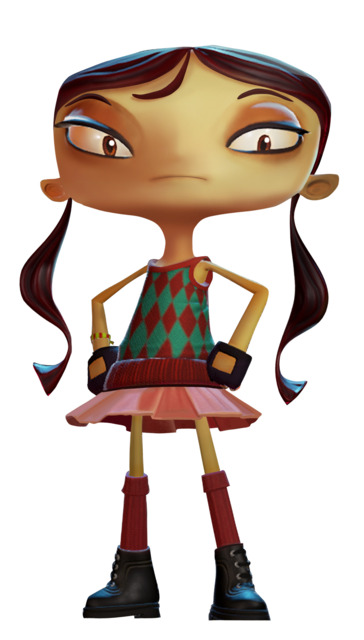
Well, real champagne glasses for the toasting ceremony I think is the main thing. There are obviously some things that would be dependent on what the crowdfunding campaign brings in. We have a minimum and if we get what we ask for, then we are really confident that we'll be able to make a game that stands up to the first game. If we get more, it really just means more time for iteration and polish and possibly expanded scope in terms of the number of levels. It's not up to the same type of variability that we had with the first project, where we're asking for $400,000. We were going to make a Flash game and then ended up making this major game. It got overfunded to that level but I think because we're asking for the larger amount, we're not pretending like we only need ... I mean we weren't pretending then, we really were only going make that small game. I think it's important in crowdfunding not to ask for less than you actually need. We're not going to ask for some really small amount and hope that we get overfunded again. We're going to ask for like, no we need $2.3 [million].
You're being openly ambitious.
Yeah. One of the most important things of crowdfunding is to be really clear about your honest goals and limitations and everything.
Let's get into the game itself. What is the elevator pitch for Psychonauts 2?
Psychonauts 2 is continuing a story that we always had planned back when we were doing Psychonauts 1 where Raz was originally in that game and at the summer camp, training to be a Psychonaut. Now he is a Psychonaut and he's at Psychonaut's headquarters, the real deal. You know where all the Psychonaut international espionage is being planned and executed. He arrives there and he finds out that the organization is having a tough time and actually needs him a little bit more than he needs them and he has to help uncover what's going on there and set things straight in Psychonaut's headquarters.
This is a true sequel in that it chronologically explains the events after the first game.
Yeah, pretty much right after the first game.
Obviously Raz returns. Are we going to see other familiar characters?
Yeah, it's going to have Raz and Lili and Sasha and Milla in it and Ford Cruller and plus a whole bunch of new characters at headquarters and other places and a whole bunch of new minds to go into.
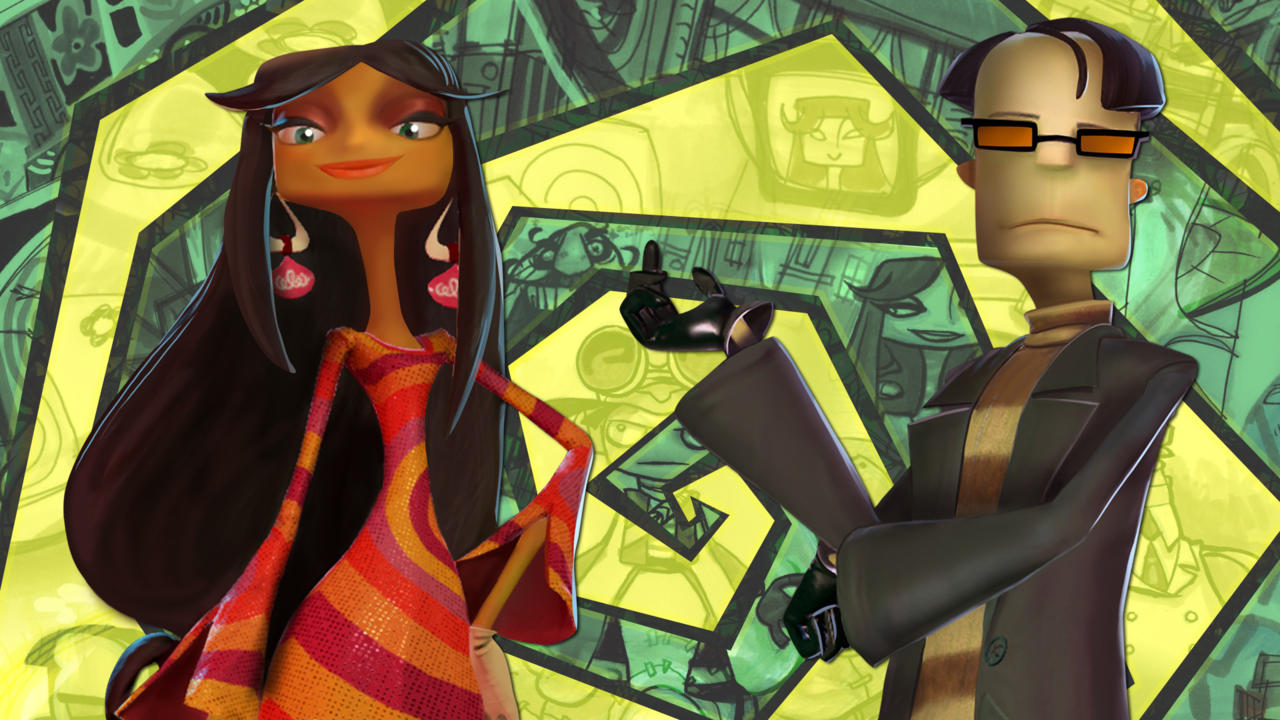
Are any of the same voice actors returning?
Yeah, we're going to have Richard Horvitz in it reprising Raz, we're going to have Nikki Rap doing Lili again, Steve Scanton doing Sasha. We're going to have all the original voice actors returning, whoever possible, and then working with some of the new friends that we've picked up along the way.
I was going to say, you guys have developed a habit of just accruing celebrity voice talent. Obviously, you had Elijah Wood in Broken Age and Jack Black, are we going to see any familiar famous voices in Psychonauts 2?
We'll see about that. We're in the studio, we always have such a good time with them that we're always like, "Oh, I want to work with you again" so we tend to, not just the celebrities, but every actor we've worked with we tend to get them back in the studio again. Some of those people like Richard have done almost everything we've recorded.
I didn't realise your sister voiced any characters in the games!
My sister's been in almost every game I've ever made starting with nurse Edna in Day of the Tentacle... you didn't recognize the tone of my voice in nurse Edna?
You guys do sound an awful lot alike.
Also in this game it's going to delve a lot more into Raz's backstory and his family history and the curse put upon his family and he's going to have to deal with a lot of those issues which were seeded in the first game.
Is it kind of a hub and spokes structure where the headquarters will serve as sort of this jumping off point for the rest the missions that you're going to go on the game?
They'll have very similar structure to the first game where we had the camp and the minds you go into as the levels, but it'll be the new headquarters location as the hub.
Given structurally it's very similar, can I assume the mechanics, the gameplay mechanics in general are going to be relatively similar or are we going to see new ideas, new gameplay ideas in the game? Are we going to see any old ideas revamped in new ways?
I mean I think we're going to really be revisiting and polishing and iterating on the game mechanics where I think the UI will change a lot, but I think it'll still be an action-adventure platformer. And there's an emphasis on psychic powers as the kind of secret source of Raz's tool kit. There's some psi powers that are so popular that they will definitely be coming back like pyrokinesis, telekinesis, and I'd like to do a few new ones to come in. I think that will shuffle around. Mostly we just want to really look hard at the first game, and see what we can make even better but as far the gameplay goes, I feel like what you loved about the first game, we just want to deliver that better and have more of it.
In each mental world there's always some gameplay twist that turns things upside down so there'll be a whole new set of those.
Each mind adds not only environmental or aesthetic variety but also gameplay variety?
Yeah. You know like in the first game, sometimes you'd be playing the whole level upside down or whatever, we had to find a whole new set of interesting ways to twist the game player around in this game.
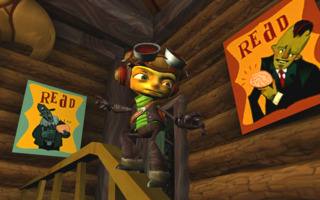
The first game came out ten years ago. We've gone through a lot of technological advancement in that time. How has that impacted the look of the game and your approach to the game's aesthetic? Are you going for a similar look that's just brighter and shinier or have you re-examined the visual style of the game?
I think we really want to be really true to the style of the first game which was a little bizarre but also very happy and dark in some places, but really we went for an art direction that was really unique and we really want to be true to that. I think what we're going to change is our ability to create high quality art has really improved since 2004-2005, so it'll be more beautiful but I think the style will be very evocative of the first game.
The other big difference is we're not going to be writing an engine from scratch this time. That's one of the reasons the first game took so long. We're going to be using Unreal [4] for the second game so that we can focus on the game play and the art style.
We're new to [Unreal Engine 4]. We've been working with it for a little while and learning it and am really excited about how it'll let us focus on not just gameplay but also whatever programming we'll do will just be on top of where the engine is right now. Whereas the first Psychonauts we were just, "How do we make a polygon move on the screen?" from day one.
Would this be your first game in Unreal 4?
We will ship one before Psychonauts 2 comes out. It hasn't been announced yet.
Can you tell us something about some of the new characters that we might encounter or is that off-limits as well?
I don't think we can talk about new characters yet except… some of them will be Psychonauts, some of them will be shady, mysterious enemies, and some of them will be new friends, but that's all I can say.
What inspired the art style of the first game which we're now going to see reprised in the second game? Because it did have a very distinctive kids-in-peril, kind of a fun and happy world but a little bit dangerous or a little bit dark in certain ways. I was wondering how you guys decided on that aesthetic in the first place and how you went about defining that visually for the game?
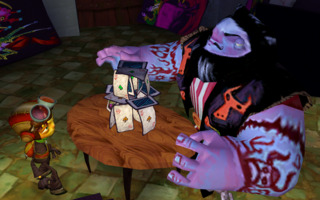
A lot of it was working with an art director like Scott Campbell who was someone who was kind of outside the games industry and I really wanted to have that look of not doing some of the established stuff that was the very standard language for art in video games at that point. I wanted to bring in something fresh. I think it shows, you know a lot of our inspirations at the time were The Nightmare Before Christmas and City of Lost Children.
Those were the kind of stories that were bright and beautiful in some spots but also really dark and creepy in other spots and I think that when you're talking about the human mind you have to talk about both those things. Because it's not a just for kids game, you know it is a family-friendly game, it's a game you can play with your kids but I think the themes are adult in a lot of ways and not adult in adult ways but adult in actually adult ways.
I assume you're referring to both the original game and to the sequel when you say that.
I definitely want to. This is a game about exploring the human psyche so it should be, I feel like explore all parts of it, the happy parts and the menacing parts and the scary parts, but still I got letters from someone who played, said I really liked playing the game with my ten-year-old. I was like, that's something to keep in mind. This is an adult who will be playing with a ten-year-old. How do you make a game that appeals to both of them? I think there's definitely ways to do that and that's what we did the first game and that's what we want to do in the second.
Who of the original staff that worked on the first game is returning for the second game? Are we going to see any of the sort of core creative team return to work on this title?
Yeah both inside and outside the company, there's people like Scott who is outside the company now but comes back to work with us from time to time and he's already been here brain storming ideas for Psychonauts 2. Peter Chan, some really incredible artists who are outside of the company but who come here. And meanwhile we have people who are on staff who are still here like Nathan Stabley, working with us. We work with Peter Mercola, I'm sure he'll be working on this one. There's also people here the company, there's more than five people who have worked here for 13, 14 years who will be reprising their roles in terms of programming, game play programming and animation like Ray Crook.
There's multiple projects going on so there's not exactly sure who will be working on what. Definitely the first group of people that I've mentioned like the art team and the music team will coming back and the voice actors.
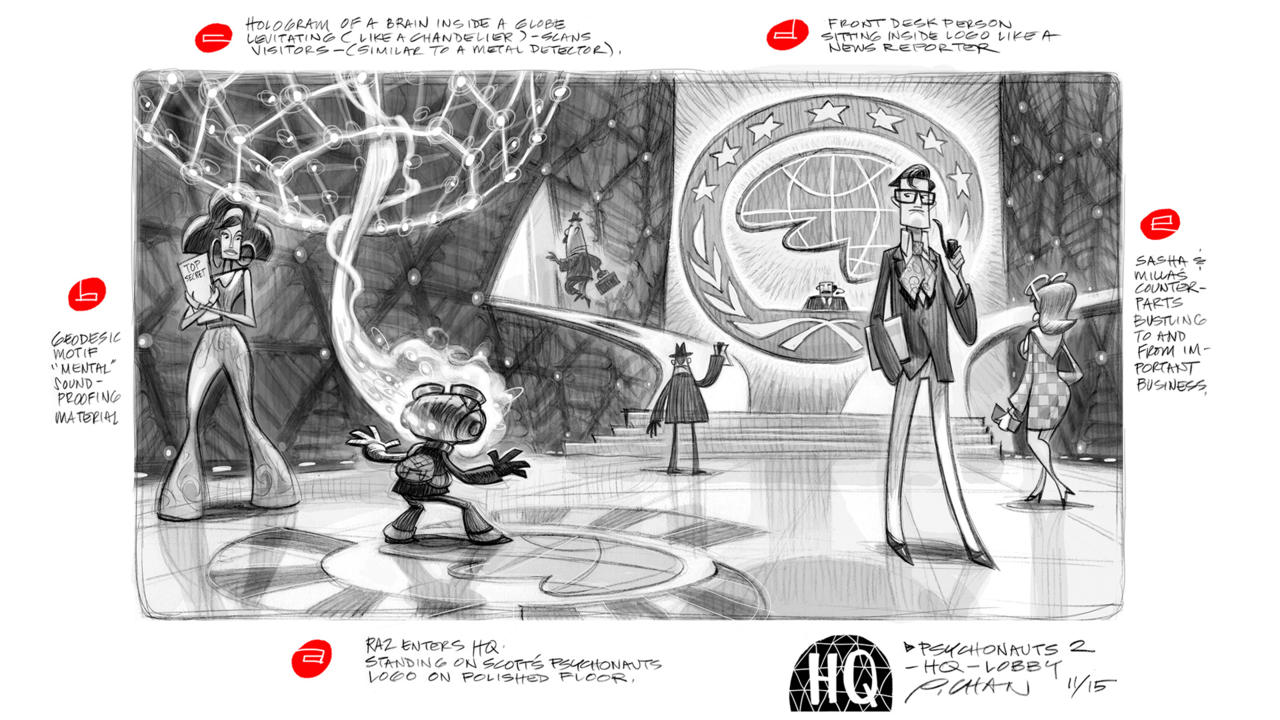
And you're handling the bulk of the script and the writing?
Yeah. I wrote the bulk of the writing for Psychonauts but I had writing help from Erik Wolpaw, he will be coming back to help us. He was a co-author of Psychonauts so he'll be coming back.
What's the release plan? PC? Ipad? All the consoles, every console? Commodor?
PC, Mac and Linux, PS4 and Xbox One and any console invented in the next three years. Probably shouldn't say that.
Do you have a release window in mind for the game?
Our campaign says July 2018.
That's a pretty good chunk of time especially which compared to the window of time you gave yourself for Broken Age.
Broken Age we were in uncharted territory. We didn't know what we were making when we started. This is a sequel to a known quantity where we have a lot of data about how long things take. We're a lot more confident of saying it'll come out in July 2018.
Has it been helpful to think back on the earlier creative process and sort of mine for new ideas based on your memories of old creation process?
Yeah, I mean you have to do both. In some ways I watch and went and rewatched City of Lost Children and movies that were inspiring me at the time, and also taking into account ten years of playing games and how games have changed and thinking about what you can do better is a big part of it, I think.
What has Double Fine learned as a studio over the past ten years that's going to influence and improve Psychonauts 2 compared to the first game?
Sometimes it's a million little things about game balance and mechanics and a lot of it ... Psychonauts was our very first console game, my very first console game. In fact, most of the whole entire team's very first console game so we basically threw in every mechanic that we liked in other games and then let them fight it out, and then made it work in the end. Now we have that as an example and a starting point. I feel like there's a theme to what we can say we've learned. We've learned how to make games and make games with each other as a team a lot better and that's just a whole different feeling. The first time we were like, "What is this game and what are we making and what is this company?" And all these questions that we don't have this time. This time we're like we know what we want to do.
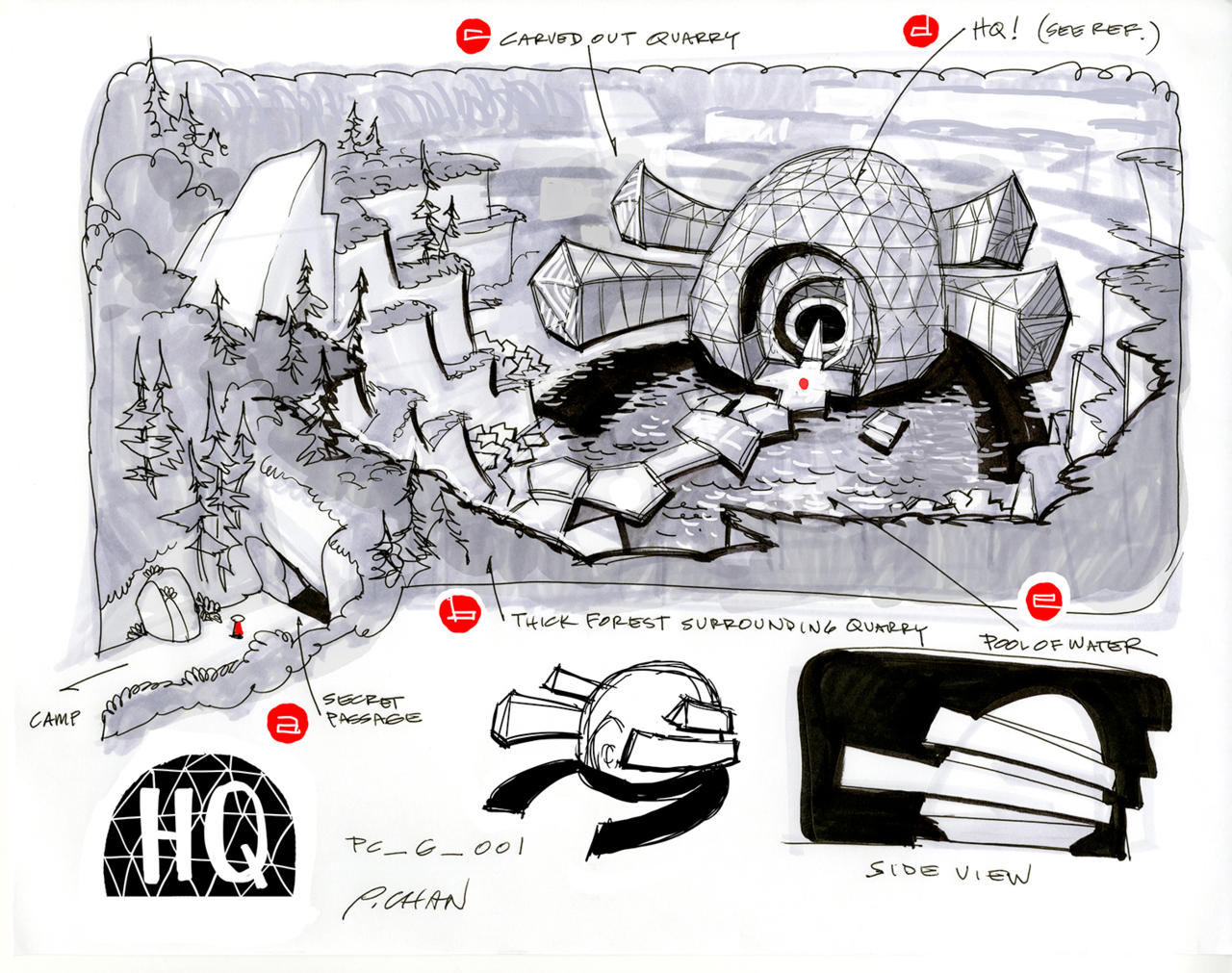
That's got to be a good feeling. There was certainly some push and pull with the first development cycle and you had a relationship with the Xbox guys and that that didn't work out. It seems like it was probably a bit of a tough time. Does this feel like redemption in a way? It's like another chance at this, your first big game as a studio and it's kind of come full circle. Is there any kind of sense of that?
Yeah, it is a really like revisiting ... In some ways coming back to school yard as an adult and being like, "This jungle gym used to be really hard to climb on and now I can stand on it and smoke a cigarette." No, I won't say that, but you know. It's like going back and beating up the high school bully from, no wait, he could probably still beat me up, that's not a good example. Being able to revisit that game but without any of the kind of distracting, time consuming issues that came up during the first game. There were struggles that really helped made the game better like iterating, game playing by playing the game and learning how to do that. That was really meaningful. Then there was stuff with the game getting canceled and our sewer system not working and just dumb stuff in the office that we don't have those problems anymore. Basically, we'll be able to focus a lot more on just making the game fun.
Psychonauts (as much as it is beloved now) at the time didn't sell immediately. It's become what a lot of people consider a cult classic. Do you agree with it's classification as being a cult-hit and if so, what is it about Psychonauts that made it such a slow burn and then something that didn't catch on the way that it has until later?
It definitely was a game that I feel like popularity rose over time. It sold a couple hundred thousand when it first came out and then went out of print and then it was kind of hard to get and then it went up digitally, especially when we got the rights back to it in 2011. We updated it and we republished it and it's since gone on to sell, like in the last five years it sold twice as many copies as it sold in the first five years. It's actually gone up in popularity and word has gotten out about it. How do I get back to the original question? I feel like its the kind of game that was really unusual and people didn't know how to place it or think about it or talk about it when it first came out. I think through word of mouth, it's just been recommended to people from their friends and slowly kind of spread around like that to the point where I think there's a lot more awareness of it now.
I think it resonated with people because it was so different, but also because it was about real characters and it was kind of an emotional but funny story. I think that sticks with people more. With the cult-classic classification, we are going to be sharing sales numbers a little bit at the launch of the campaign which I don't think we've ever done publicly. Its total sales are nearing 1.7 million units now on the game to start.
How are you feeling about it?
I am super happy about it. It's a game that really is very special to us as a studio and really personally to me, I really really love that game and so it's really nice to revisit it and feeling like you could do a really amazing job at a second take on Psychonauts.

